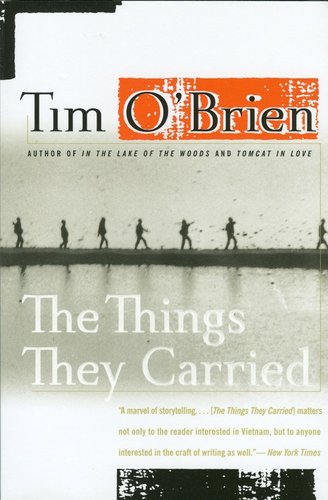Tim O'Brien's The Things They Carried is probably the most famous literary book about the Vietnam War, of which there are surprisingly few. (Robert Stone's Dog Soldiers, a vastly different book, comes to mind.) Is it that the Vietnam War was so psychologically injurious to so many that it became difficult to write or talk about? O'Brien is clear throughout this series of connected, semi-fictional stories, that he feels as if writing about his experiences in Vietnam saved him from the kind of rootless madness that destroyed so many of his friends after the war--like Norman Bowker, whom he describes driving around his Iowa hometown, wanting but unable to tell his story to anyone he sees. Bowker, we learn in a subsequent chapter, hanged himself shortly after. But we also learn that one of the linchpin moments of Bowker's story--his inability to save his friend who is dragged down and suffocated in a feces-filled river, where they had mistakenly set up camp--is O'Brien's own, grafted onto Bowker's experiences.
So what's the deal? Are these stories fiction, or non-fiction? O'Brien writes:
Forty-three years old, and the war occurred half a life-time ago, and yet the remembering makes it now. And sometimes remembering will lead to a story, which makes it forever. That's what stories are for. Stories are for joining the past to the future. Stories are for those late hours in the night when you can't remember how you got from where you were to where you are. Stories are for eternity, when memory is erased, when there is nothing to remember except the story.
Norman Bowker is no more, but O'Brien's appropriation of him, in a way, I think, is meant to keep him alive, to subsume his own story into O'Brien's in a way that justifies what he must have felt was the sad wastefulness of his life. In other places, O'Brien is cagey about what "really happened," as when he hedges on whether or not he was actually responsible for the death of a young Vietnamese man. The death rattles him; he sits in shock over the man's body and imagines a life in which he has a girlfriend, wants to teach math--not a true story, of course, he knows nothing of the man, but a story which serves an important purpose amid the abject purposelessness of war and death. In the same way, O'Brien suggests that it doesn't matter if he pulled the pin on the grenade which killed the man; he must take responsibility for his death in the same way that, writing his story, he takes responsibility for his life. (It reminds me also of the scene in All Quiet on the Western Front when Paul Baumer kills a man in his foxhole, and then has to stare at him for hours until he goes nearly mad with regret.)
Still, there's no doubt the details are rooted in fact. The Vietnamese who died died, the man who drowned in shit drowned in shit. The bullet in O'Brien's rear was real. Even in their slipperiness, these stories make the reader face the really awful reality of war, as well as any book I've ever read (with the exception perhaps of The Red Badge of Courage and All Quiet on the Western Front).
This, like the next few books I'm going to review, I read because I'm supposed to teach it next year. That's going to be hard. Partly because it is graphic, and so horrific, but I expect my students will be frustrated also by its anti-realistic elements, too. It'll probably be good for them.


2 comments:
I love this book. It's like a case study for the power of fiction to heal and create empathy, for me. I can't imagine it working without the anti-realist elements.
My favorite passage from this book:
You can tell a true war story by the questions you ask. Somebody tells a story, let's say, and afterward you ask, "Is it true? and if the answer matters, you've got your answer.
For example, we've all heard this one. Four guys go down a trail. A grenade sails out. One guy jumps on it and takes the blast and saves his three buddies.
Is it true?
The answer matters.
You'd feel cheated if it never happened. Without the grounding reality, it's just a trite but of puffery, pure Hollywood, untrue in the way all such stories are untrue. Yet even if it did happen--and maybe it did, anything's possible even then you know it can't be true, because a true war story does not depend upon that kind of truth. Absolute occurrence is irrelevant. A thing may happen and be a total lie; another thing may not happen and be truer than the truth. For example: Four guys go down a trail. A grenade sails out. One guy jumps on it and takes the blast, but it's a killer grenade and everybody dies anyway. Before they die, though, one of the dead guys says, "The fuck you do that for?" and the jumper says, "Story of my life, man," and the other guy starts to smile but he's dead.
That's a true story that never happened.
Post a Comment